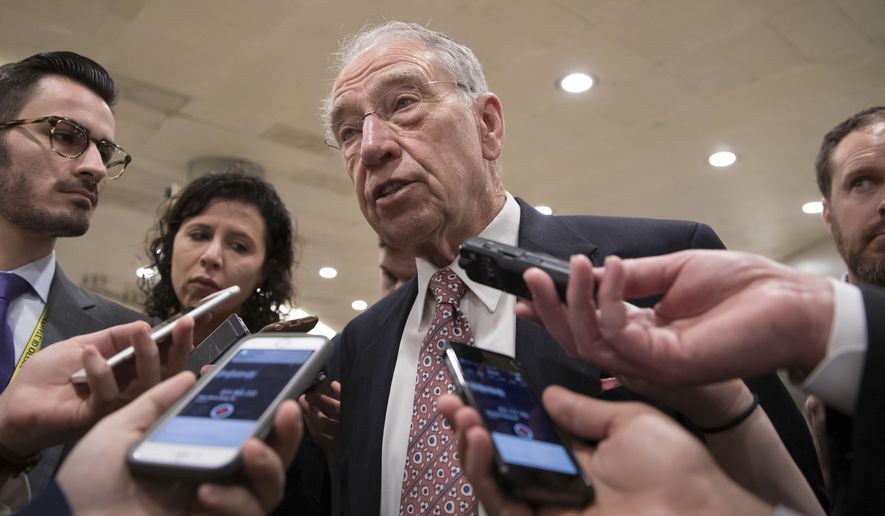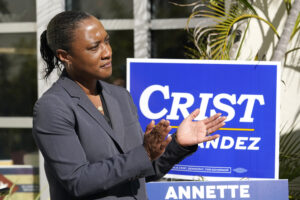Two Trump Judicial Nominees Out After Being Deemed Unqualified
Brett Talley, who had never tried a court case, and Jeff Mateer, who made derogatory comments about transgender children, were candidates for the federal bench. Senate Judiciary Committee Chairman Charles E. Grassley encouraged the White House earlier this week to revoke Brett Talley and Jeff Mateer's nominations. ( J. Scott Applewhite / AP)
Senate Judiciary Committee Chairman Charles E. Grassley encouraged the White House earlier this week to revoke Brett Talley and Jeff Mateer's nominations. ( J. Scott Applewhite / AP)
A White House official confirmed this week that two of President Trump’s judicial nominees, Brett Talley and Jeff Mateer, would be withdrawn from consideration.
Talley’s nomination was criticized for his lack of experience—he has never tried a court case—and his failure to disclose that his wife works at the White House counsel’s office.
Mateer came under fire after referring to transgender children as part of “Satan’s plan,” calling the 2015 Supreme Court ruling on same-sex marriage “disgusting” and suggesting it could spur polygamy or bestiality. His nomination met with strong opposition from Democrats and LGBT rights advocates.
Chad Griffin, president of the Human Rights Campaign, said, “Jeff Mateer’s extreme rhetoric and hateful comments are disqualifying for any public official and should have prevented Donald Trump from nominating him to begin with.”
Talley’s nomination was endorsed by the Senate Judiciary Committee in November. Mateer had yet to be scheduled for a hearing. The announcmement that both nominations would be dropped came after Iowa Sen. Chuck Grassley became the first Republican senator to publicly oppose them.
California Sen. Dianne Feinstein added, “I think the quality of judicial appointments is important. I think experience is important. I think having tried a case is important. I think being able to separate yourself from your political thinking is important. I think respect for the Constitution is important. I think not being an extremist is important. So I’ll leave you with that.”
Business Insider adds context to Trump’s unusual selections of judicial nominees:
One casualty of that is a screening process that all but one president since the Eisenhower administration has utilized prior to publicly announcing its nominations. The result has been a spike in nominees rated as “not qualified” under Trump.
The American Bar Association, which traditionally screens the candidates prior to their nomination but has, under Trump, done the screening after they have been publicly announced, unanimously rated two of the 51 nominees it reviewed as “not qualified.” Of the roughly 1,800 nominees the organization vetted from 1989 to 2016, just two had unanimously been voted as “not qualified” by the panel.
Business Insider continues:
Dianne Feinstein, the ranking member of the Senate Judiciary Committee, told Business Insider in a statement that the spike in “not qualified” nominees put forth by the Trump administration is “very worrisome.” …
“It’s also very concerning that the chairman is scheduling hearings before ABA evaluations are complete,” she continued. “These ratings are an important tool to help senators evaluate these lifetime appointments. Threatening to eliminate the blue slip, scheduling hearings before nominees are reviewed by the ABA, rushing controversial circuit court nominees to the floor to minimize scrutiny — taken together, it’s clear that Republicans want to remake our courts by jamming through President Trump’s nominees as quickly as possible.”
Talley, who worked as a speechwriter on Mitt Romney’s 2012 campaign, received a unanimous “not qualified” rating from the Senate Judiciary Committee. Politico continues:
Late last month, Sen. John Kennedy (R-La.) said he would vote against Talley “in a heartbeat.”
“I had no idea of his connection,” Kennedy said of Talley’s marriage to a White House staffer. “And he’s never tried a lawsuit in his natural life. And he’s gonna be on the federal bench? Give me a break. A break. It is [embarrassing]. And I think the president of the United States is getting some very, very bad advice.”
At a Senate Judiciary Committee hearing Wednesday, Sen. Kennedy asked Matthew Petersen, another of Trump’s judicial nominees, a list of legal questions that Aderson Francois, a professor at Georgetown University Law Center, said could be answered by “a second year law student.”
“In the past year, I have supported nearly every one of President Trump’s picks, but I don’t blindly support them,” Kennedy said. “I ask questions that I expect them to be able to answer. In doing so, I’m just doing my job. That’s why we have a Madisonian-inspired separation of powers. We need checks and balances so that we can serve the American people well.
Your support is crucial…With an uncertain future and a new administration casting doubt on press freedoms, the danger is clear: The truth is at risk.
Now is the time to give. Your tax-deductible support allows us to dig deeper, delivering fearless investigative reporting and analysis that exposes what’s really happening — without compromise.
Stand with our courageous journalists. Donate today to protect a free press, uphold democracy and unearth untold stories.









You need to be a supporter to comment.
There are currently no responses to this article.
Be the first to respond.